
NORTHEAST

Wednesday, October 16, 2024 – Volume 38 Issue 8

@tccthecollegian • collegian.tccd.edu



Wednesday, October 16, 2024 – Volume 38 Issue 8

@tccthecollegian • collegian.tccd.edu
LAUREN HARPER & FOUSIA
ABDULLAHI
editor-in-chief fousia.abdullahi@my.tccd.edu
NE Campus’ Children’s Center closed Oct. 11 after police investigated an incident between a teacher and a child.
Parents came to the center Oct. 9 for pickup and were informed that the center would close in three days. When parents asked for the reason, NE administration officials said they could not comment.
“We made the decision based on what we considered the school to no longer meet our TCC standards, and one
of those standards included a personnel-related matter,” Vice Chancellor of communications and external affairs Reginald Gates said.
Jason Dziuk, the father of the child involved in the incident, said his child was fidgeting during nap time. He said then “a teacher became frustrated and responded inappropriately.”
The parents of the child were shown a report and a video of the incident and determined that it didn’t warrant the reaction from TCC.
“When I saw the instances, when I saw the footage, I was troubled. As a mother, I feel
bad for my kid,” said Jenny Zheng, the mother of the involved child. “I know they were investigating. I was working with them. I was worried. I was shocked, but I was OK. My life was still going.”
Dziuk added that the center’s “devastating” closure “is traumatizing and hurting [his son] a thousand times over anything that happened that Friday.”
Zheng detailed how the change negatively impacted her day-to-day life.
“But when I heard the news about the school shutting down, I lost all my sleep,” she See Center, page 3

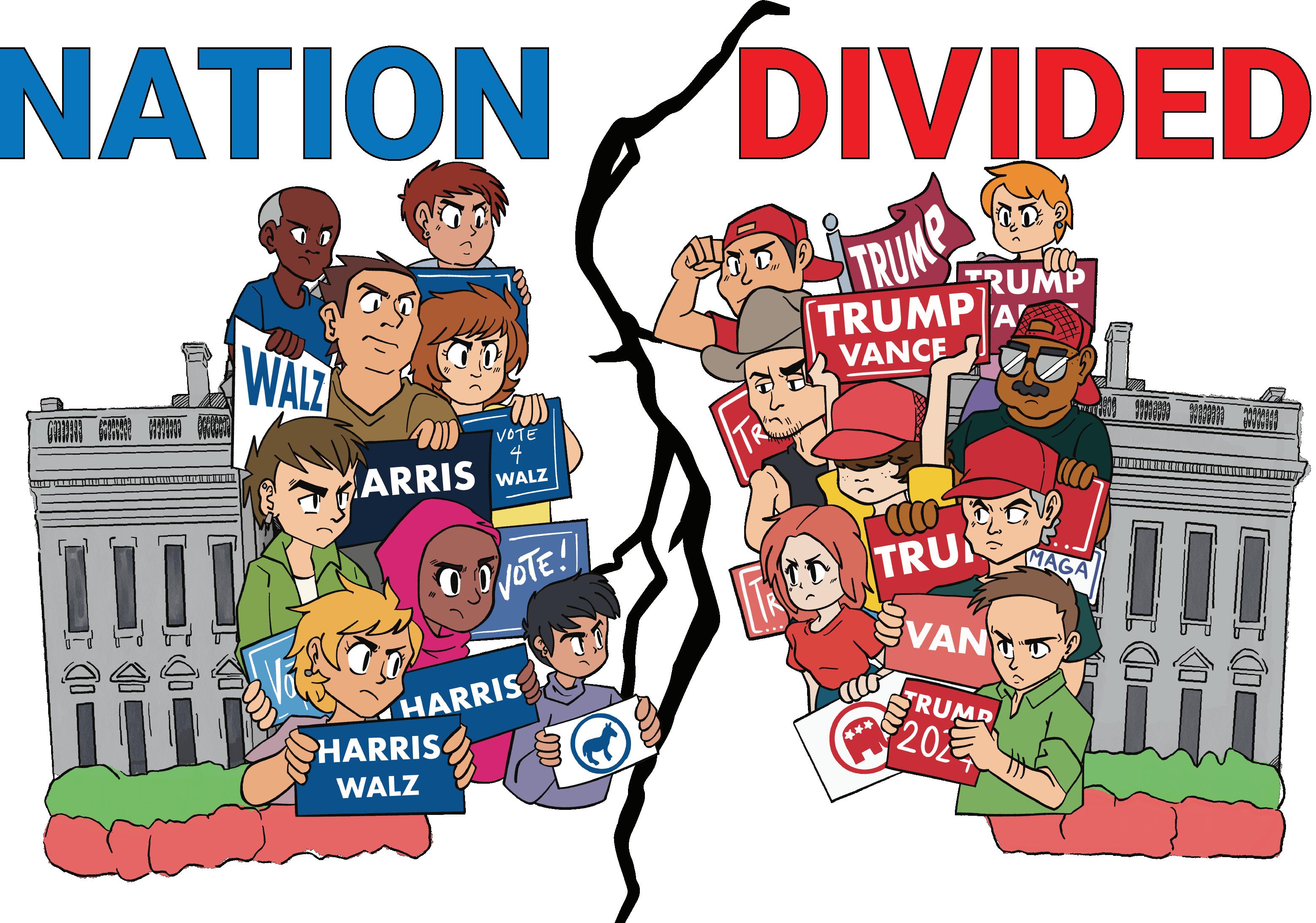
ASH PETRIE campus editor ashleigh.petrie@my.tccd.edu
More TCC students said they intend to vote for Vice President Kamala Harris in the upcoming presidential election, according to a districtwide poll conducted by The Collegian.
Of the 103 students surveyed across all six campuses, 49% said they plan to vote for Harris. Former President Donald Trump followed with 24%, and 4% said they would vote for thirdparty candidates. The remaining 23% of students said they were undecided.
However, almost all students said they felt challenged when trying to decide which candidate to support.
“There is a lot at stake, and I want to make sure my voice counts,” said TR student Katelyn Shankle, a first-time voter, like many others surveyed. “It feels like I’m finally a part of something important.”
While many feel enthusiastic about voting, students are concerned about the

impact their decision will have on their future. TR student John Mullen said he thought this election was nothing more than a choice between two evils.
“I don’t feel like I trust any of them enough,” Mullen said.
Mullen said he does not feel seen or heard by either candidate, which was a common response among students. The main reason why students reported not feeling seen was due to them not feeling important to the decisions being made.
“I’m just a college student who hasn’t really accomplished something big that they would notice,” said NE student Bethany Weaver.
For NW student Lauren Desir, this election is personal. She’s a secondgeneration Haitian immigrant, and she has seen reports of Trump and his running mate JD Vance making false claims about the Haitian community in Springfield, Ohio.
“I’m neither Republican nor Democrat, but I do know recently that Trump was saying things about Haitians See Poll, page 9


HUDA QURESHI managing editor huda.qureshi@my.tccd.edu
According to Pew Research, more than half of Texans consider religion to be very important. As the upcoming election approaches, many will look toward their religious values when picking candidates.
Intisar Gamalele, a NE student from Sudan who identifies as Muslim said abortion is “haram,” which means it is impermissible in Islam. However, she agrees that in some cases it should be allowed.
“If you’re sick or you aren’t able to [give birth], you have a right to go to the doctor and get an abortion,” Gamalele said.
NE student Jonathan Humphrey said he originally wasn’t going to vote but was convinced to vote for former President Donald Trump due to his stance on abortion.
“I was talking to a friend about it, and he’s like, ‘Look, at the very least I could be happy with Trump because he’s going to have less abortion under him,’ he said. “That’s the primary reason why [I’m voting for him]. Everything else is secondary.”
Tarrant County Bishop Mark D. Kirkland, a non-denominational member of the Muslim and Hebrew-Israelite faith, said he is pro-life. However, he understands some prochoice arguments.
“I don’t think rich white men should be sitting in a room deciding what women should do with their bodies,” he said.
Kirkland emphasized the importance of voting to make sure your voice is heard, especially in local elections.
“I plan to be more active for local electives than I plan to be for the national election,” he said.
“What happens at the bottom affects us more than what happens at the top.”
Faith plays a big role in Kirkland’s life. He said he doesn’t align with the Democratic or Republican party due to his beliefs and
wishes to see a new candidate all together. He said he wants to see the younger population make way for a new candidate.
“I want to personally challenge [the youth] to get involved in the electoral process this time and over the next three or four years, if their candidate wins, I want them to evaluate their decision to vote, to determine their future plans of voting,” he said.
Sean Foushee, a NE graphic design instructor and an evangelical Christian, said his ideal candidate is someone who brings people together.
“We have too many candidates that meddle in that concept of either you agree with us or you’re the enemy,” he said. “And if you don’t fully agree with us then we’re going to tear you down negatively.”
Foushee said many people put their faith into fleeting things, including politicians.
“People get really wrapped up in the politics of things without stepping back and realizing that we’re talking about people that we’re voting for, and people are flawed,” he said.
“Everybody, including Christians, every walk of faith, we’re all flawed. “
He said people forget about core religious teachings such as loving all people despite their political leanings.
“If you don’t vote for my person and the other person wins, there’s going to be catastrophe upon catastrophe,” he said.
“There’ll be a world war. Borders will be flung wide open, and the entire country will be turned upside down. It doesn’t matter which side of the political spectrum you’re talking about. They both are talking Armageddon over a single person.”
Foushee said he is able to look beyond the divisive political climate due to his strong belief system and ability to give evidence of why he believes in what he does from a faithbased perspective.
“Be ready to give a defense for what you believe with gentleness and kindness,” he said. “I feel that’s something that’s missing in today’s society.”


FRED NGUYEN campus editor collegian.editor@tccd.edu
Young voters could be one of the key voting blocs in this year’s elections, said Harvard professor.
Thomas Patterson, the Bradlee professor of government and the press at Harvard University’s Kennedy School of Government, presented recent polling data and analyzed how different demographics could vote in this election at a talk on Oct. 8 at NE Campus.
Patterson pointed out the generational gap in politics and a recent trend of young voters leaning toward the Democratic party.
“That, to me, is the ticking time bomb for the Republicans,” he said. “Unless they can figure out how to crack the young voters, you can’t keep doing this election after election. Because if your voters are the older voters, I’m sorry, but they’re not going to live forever.”
Patterson said young voters will be one of the keys to victory in November, just like they were in the last election when they voted overwhelmingly for Joe Biden.
Other voting blocs also show changes since the last election in recent polls, Patterson said.
The white vote has not been held by the Democratic Party since 1964. Workingclass whites have generally voted Republican, but in 2016, college-educated whites voted more for Democrats than Republicans for the first time.
Women have also leaned toward the Democratic Party, with the Vice President Kamala Harris leading by 11% among women compared to for President Donald Trump’s 17% lead among men.
The Black and Hispanic vote for Democrats has dropped 9% and 11% since the last election and both groups are shifting to the Republican Party.
“Historically, these [votes] been very important and they’re the margins that
allow Democrats to win elections,” Patterson said.
Patterson also pointed out the division of votes among rural, suburban and city residents. Harris currently leads both cities and suburbs, with rural votes being overwhelmingly for Trump.
Patterson also spoke about the Electoral College and which states could decide the election.
While most states either decidedly lean Democratic or Republican, swing states like Georgia, Pennsylvania and North Carolina are less predictable. Harris is projected to gain seven more electoral votes than Trump, according to CNN’s Road to 270 Interactive, but 93 votes are still a toss-up.
At the end of the talk, Patterson repeated his question to the audience from the beginning of his presentation — who did they think were going to win the election? Many of the audience did not change their minds and raised their hands for the same candidate. Some were now uncertain.
During the Q&A session, NE student Chelsea Scott asked Patterson about misinformation in the news and media from both sides. Scott had attended the talk in the hopes of learning more about the topic.
Scott said she liked Patterson’s unbiased presentation and analyzation of polling data.
“He was giving the facts for both sides and all kind of groups of people,” Scott said. “And I liked that he was able to give all of the information proving those things that he was saying.”
Assistant professor of English Toni Whalen said it was interesting to see how both parties have tried to engage with young voters, especially student voters.
“I think college students are always kind of a wild card in elections,” Whalen said. “If you can motivate young people to get out and vote, they can make a big difference in an election.”
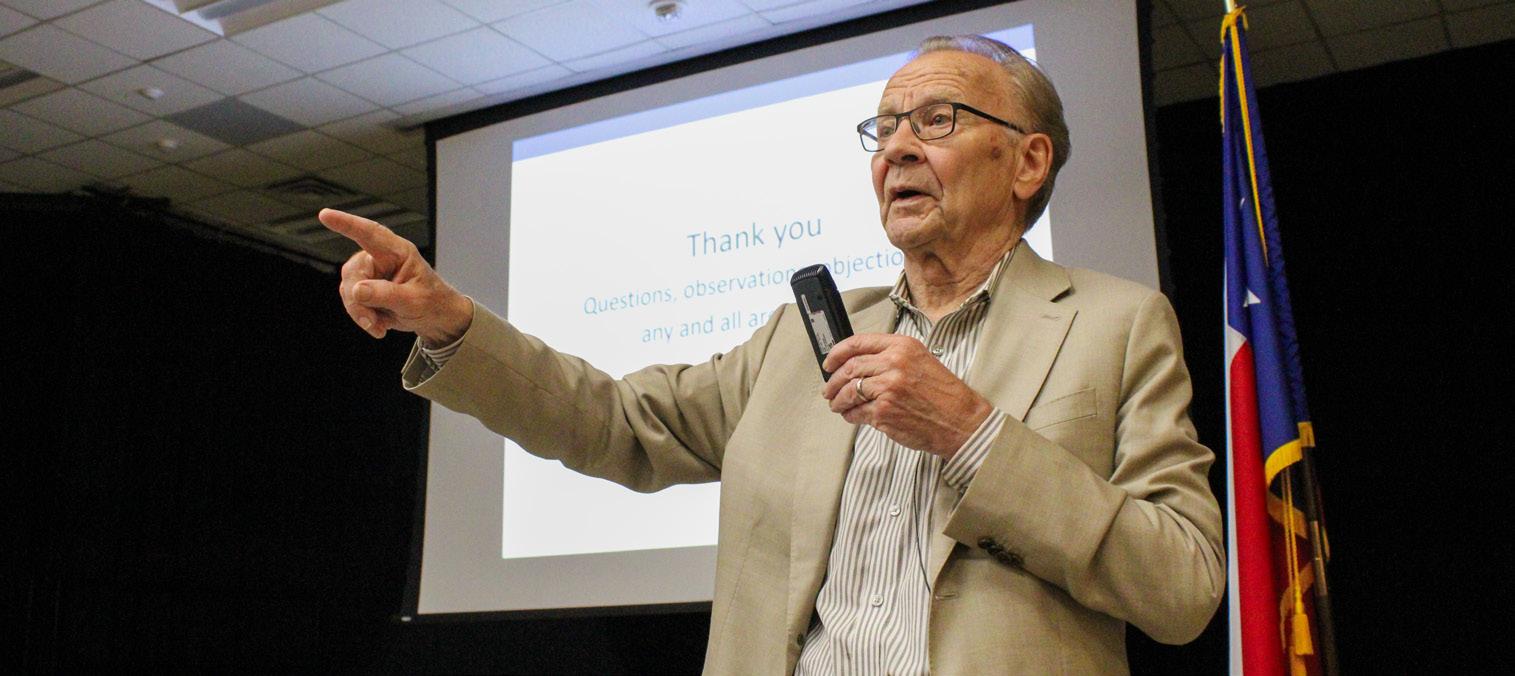
All TCC campuses, except TR and Connect, will offer early voting from Oct. 21 to Nov. 1 following a vote to keep polling locations at various North Texas colleges.
The ballot will include candidates for senator, railroad commissioner, county commissioner, president, sheriff and district judge.
Janet Mattern, president of the League of Women’s Voters of Tarrant County, said all locations for early voting and Election Day must have available parking, including ADA and curbside options, unless there’s bad weather.
She recommended, along with a valid ID, bringing a printed list of your chosen candidate for each position as phone use is prohibited at the booth. She also suggested checking where to vote online since Tarrant County residents can vote at any open polling location.
“If your parents can do it, if your grandparents can do it, then you can do it too. It’s just a matter of making sure you’re prepared, that you educate yourself and identify a plan like are you going to vote early? “What location do you want to vote at,” she said. “If you can work a cell phone, you can work the voting booth.”
Mattern said one of the biggest reasons she chooses to vote early, besides avoiding the consistently long

lines on Election Day is to ensure her vote is cast.
“My vote is so important, I don’t want to leave it to chance that something might happen,” she said. “Who knows what can happen on Election Day? It’s like when you’re having to do an assignment for school. It always feels better once it’s done, and then you don’t have to wait until the last minute.”
Lisa Uhlir, a tenured professor of government at NE, said on-campus sites help make the voting process seem more approachable, a barrier for many students when deciding whether to vote.
“[Early voting] allows for a lot more openness,” she said. “Students get to see here our campus professors go vote. I’ve talked to my students. I’m like ‘Hey, early voting’s here. You have easy access to it. You can do it on any day.’”
Uhlir said she emphasizes the importance of this democratic process in her curriculum to encourage and empower her students to get involved in politics.
“I believe efficacy for young people comes through the knowledge of the system and how it matters,” she said.
“The more that they feel comfortable, actually understand how it works – the
basic process – they’re more likely to vote.”
Polling accessibility is crucial when getting a younger demographic to vote, a group with substantially lower turnout. Former mayor of Kennedale and social sciences department chair Brain Johnson said this accessibility was directly threatened by the potential removal of polls on higher education campuses.
“Younger people are, right now, preoccupied with other things: school, getting to school, eventually finding a job,” he said. “Young people will register to vote but getting them to the polls is much more difficult. We should be pushing to make it easier and easier to vote.”
Johnson pointed out that historically, election results were swayed by only several thousand votes.
“A swing of 50,000 votes in the 2016 election in key states made Donald Trump president,” he said. “When you’re talking about a state-by-state election, especially for president, it’s critical that these small numbers of people can swing an election. Your vote does count.”
NE student Chris Joyner advised students who feel discouraged about voting in national elections to remember the significance of local representatives.
“Get out and vote in local elections, because that’s where it starts,” he said. “At the end of the day, you need cooperation with the House for whoever is president, and whoever is in the House starts with those local elections.”
said. “My life stopped.”
Dziuk did not describe the teacher’s inappropriate action and declined to identify the teacher involved. He said the Texas Department of Family and Protective Services’ child care investigations program was looking into the matter. The DFPS-CCI investigates child abuse, neglect and exploitation in child care homes and centers.
“TCC police said they looked at it, and they see nothing of concern that they would take any action on,” Dziuk said. “The investigator told me that explicitly before he asked me if I wanted to press charges. And then, of course, after reviewing it, it’s an ‘Absolutely not.’”
TCC police detective Brandon Clarke declined to provide additional information.
According to a public report from the Texas Health and Human Services, another complaint was made in May that standards were not met and there was a greater risk to the safety of children.
“A caregiver did not demonstrate competency and good judgment, when grabbed a child by his arm as method of redirection,” the report said.
TCC had two instances where employees self-reported incidents that happened at the center. In the incident with the teacher grabbing the student’s arm, it was determined that the standard risk level was high.
Dziuk said parents discussed whether there may be an alternative reason for the sudden shutdown. He cited information from a press release issued by the district Feb. 7.
“There was a very substantial amount of money that came to the district for the opening of those two other child care centers at South and NW campuses,” he said. “If that level of money can keep coming to open more elsewhere, then our center is a breakeven competition that they would need out of the way.”
Parents of children enrolled at the day care attended a work session on Oct. 10 to express their concern for the consequences of the closure for
the children and staff, including Cuc Mauldin, a parent of two who attended the center.
“We were kept in the dark until Oct. 9,” Mauldin said. “No apologies to the staff or the parents. They offered a solution by sending a list of day cares, like ‘Here, we’re done with you.’ We’re not happy with that solution. We don’t have time to figure out which day care and what happened.”
A petition signed by 20 of the 23 enrolled families was brought to the board protesting the closure.
Zheng said the signatures were “completely voluntary” and that there was “no pressure on these parents to sign the petition.”
TCC police said they looked at it, and they see nothing of concern that they would take any action on
Jason Dziuk
Father of child affected
Zheng sent an email to TCC board members Monday asking for the removal of NE Campus leadership.
“Over the past three years, our family has been through six different schools,” she said. “TCC has provided the best care for our children, hands down. Even after the incident, [the child] didn’t remember what happened and he still thinks his teachers are the best people in the world.”
The center had a years-long waiting list of families seeking child care at the center.
“I have no plan for my 1-and-ahalf-year-old,” Jeanette Favela said. “Our plan was for him to start next year, and now I have to be on a search to look for a school that is up to par with, or hopefully on the same level as TCC, but I don’t think there is one.”
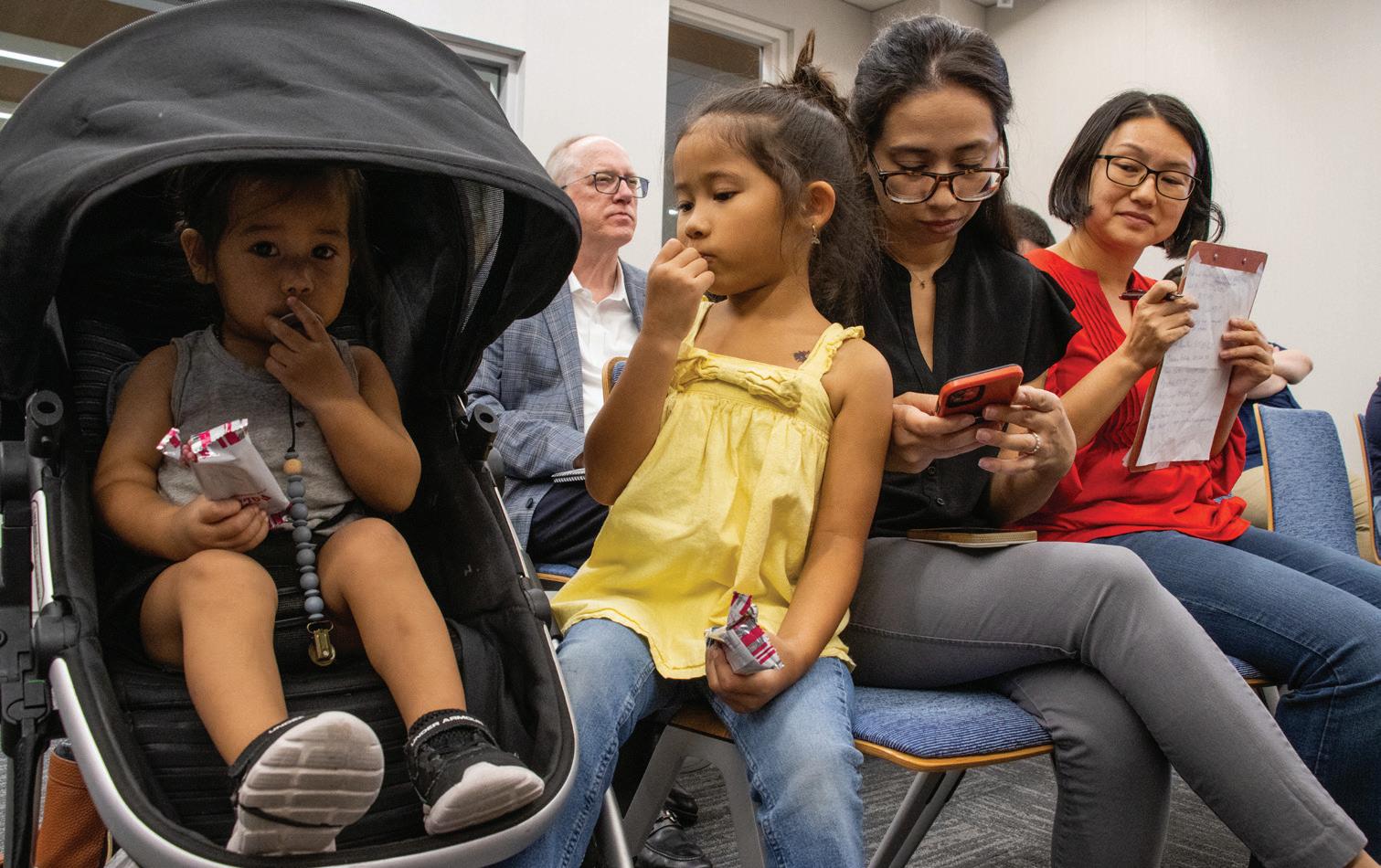
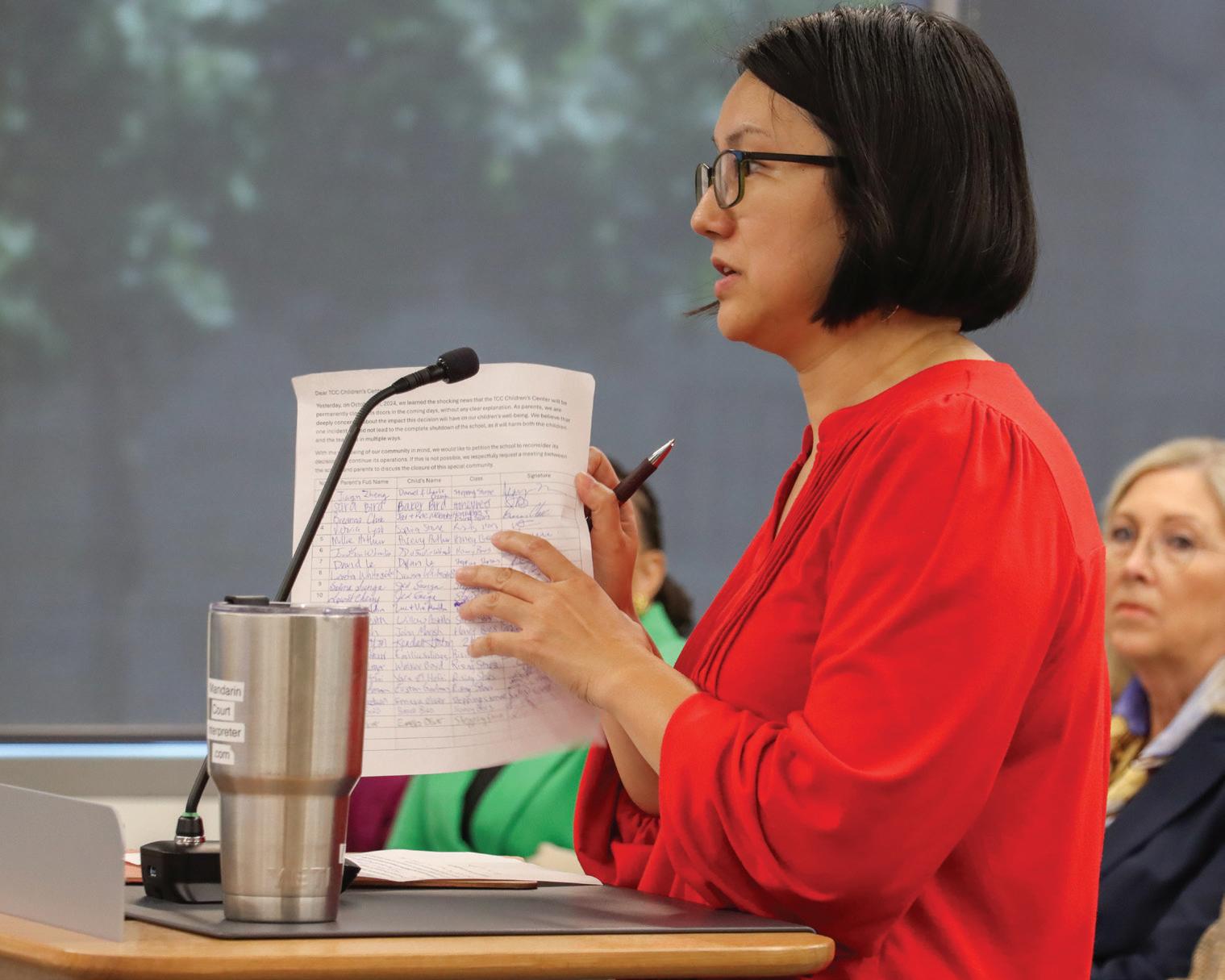
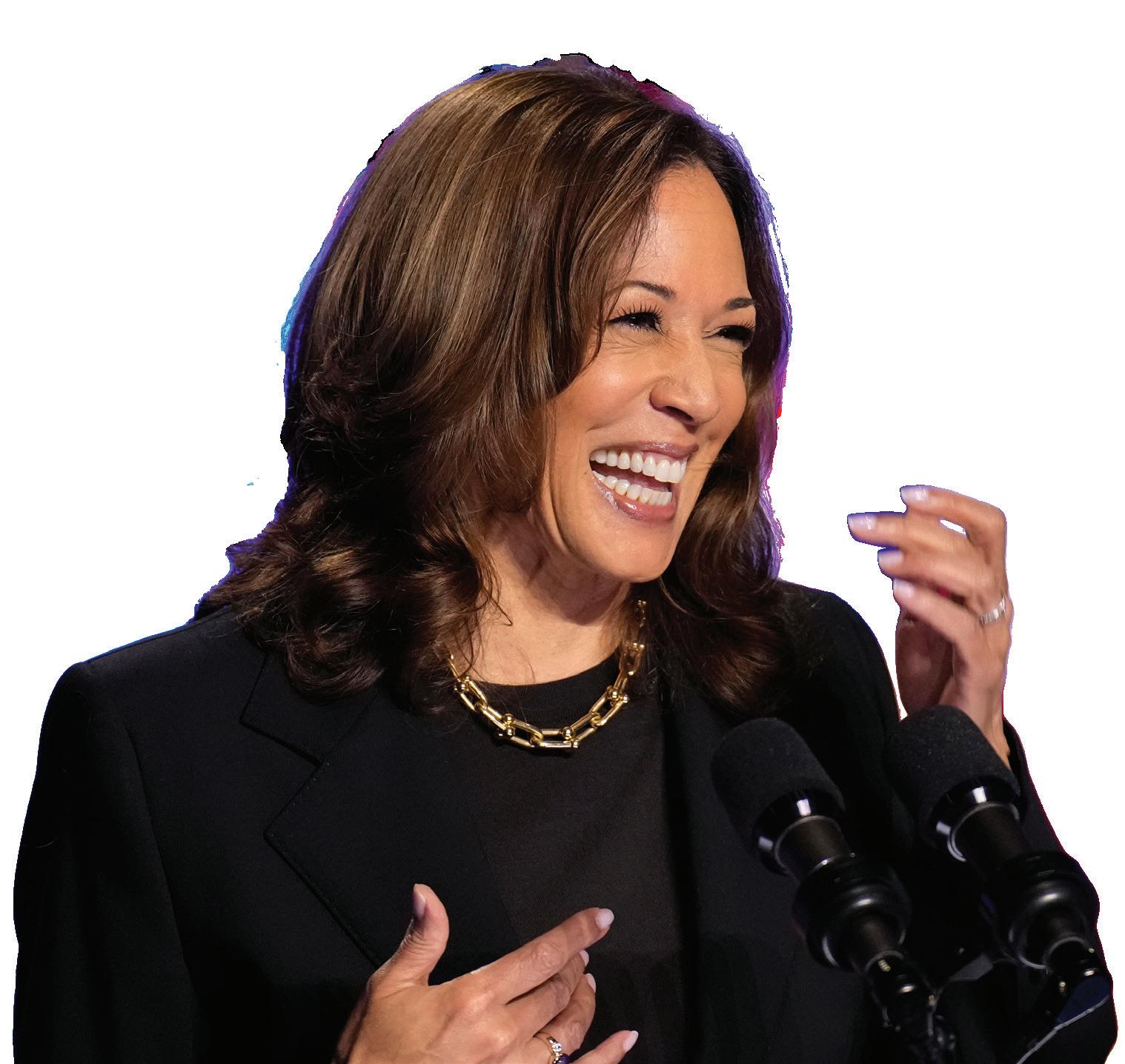

“I’m in favor of the Second Amendment, and I am in favor of reasonable gun safety laws — for example, background checks.” 04/11/24
“I am being precise. We need to put into law the protections of Roe v. Wade,” Harris said in that interview. “07/29/24
“This issue cannot be reduced to a political issue. We’re talking about children, we’re talking about families, we are talking about suffering.” 06/25/21
“As president, I will double the resources for the Department of Justice to go after those transnational cartels and take action to stop the flow of fentanyl coming into our country, which is destroying entire communities.” 09/29/24
“Our Education Department has extended protections to transgender youth, undoing some of the unfair, to say the least, procedures and policy perspectives of the last head of the Department of Education.” 06/23/2021
“We know that we have a shortage of homes and housing, and the cost of housing is too expensive for far too many people. We know that young families need support to raise their children. And I intend on extending a tax cut for those families of $6,000, which is the largest child tax credit that we have given in a long time.” 09/10/24
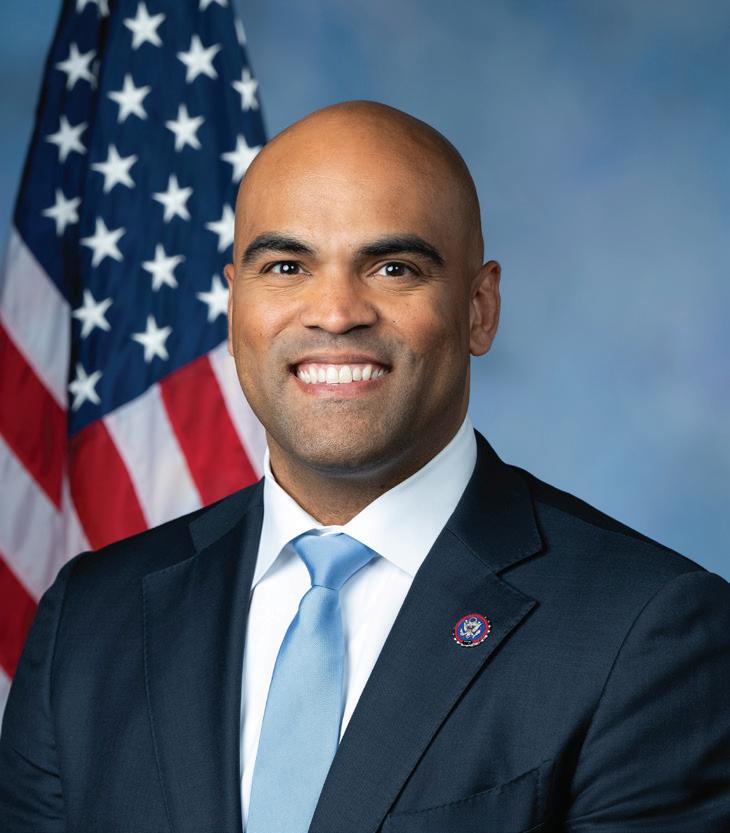
“Democrats in Washington continue to hold common sense school safety measures hostage to their radical gun control agenda, which, in virtually all cases, would do nothing to prevent attacks by demented and disturbed individuals,” 04/21/23
“I believe in the exceptions for rape, incest and life of the mother. I believe strongly in it. Ronald Reagan did also. 85% of Republicans do. Exceptions. Very important.” 09/10/24
“Following the Eisenhower Model, we will carry out the largest domestic deportation operation in American history.” 09/20/23
““Under my leadership, we took the drug and fentanyl crisis head on, and we achieved the first reduction in overdose deaths in more than thirty years.” 06/06/23
“Upon my inauguration, I will direct the FDA to convene an independent outside panel to investigate whether transgender hormone treatments and ideology increase the risk of extreme depression, aggression and even violence.” 04/14/23
“Everybody knows what I’m going to do. Cut taxes very substantially. And create a great economy like I did before.” 09/10/24
To deny women in emergencies the life saving abortion care they need is cruel and outrageous. 06/27/24
To address the crisis at our border, our border protection, customs and immigration agencies need support and staff. 06/25/24
Now more than ever, we must ensure North Texans have a voice in the federal budgeting process by working together to ensure community projects. 05/20/24
Reversing Roe v. Wade is nothing short of a massive victory for life, and it will save the lives of millions of innocent babies. 06/24/22
I support legal immigration ... right now, cartels are exploiting our open border. 07/17/24
I’ve teamed up with Democrat Senator Mark Kelly to pass landmark legislation streamlining environmental permitting rules for new semiconductor factories. 09/22/24



To
FOUSIA ABDULLAHI editor-in-chief collegian.editor@tccd.edu
Students have said one of the most confusing aspects of voting is the Electoral College. NE history and government instructors broke it down at an Electoral College presentation on Oct. 7.
Every four years, a group of electors equal to the number of representatives in Congress is the Electoral College.
“The [Founding Fathers] didn’t want a powerful single figure to act as a king,” NE Campus U.S. history instructor Derrick Shelton said. “They were afraid of mob rule or unrestrained majoritarianism.”
The Founding Fathers thought the Electoral College would be the answer to the popular vote, preserving each state’s rights and allowing the executive branch to be independent.
Each state elects the president, including the District of Columbia’s three electors. There are 538 electors. To win, a candidate must secure 270 electoral votes.
Electors are chosen in a two-part process. First, each political party in a state chooses a slate of possible electors before the general election. Second, during the general election, each state’s voters select their electors by casting their ballots.
The 14th Amendment states that electors can’t be anyone who has “engaged insurrection or rebellion against the United States or given aid or comfort to its enemies.”
NE student Keeton Charbonneau said it’s essential for everyone to vocalize their beliefs and be well-informed on both sides of the political aisle.
“Whether you’re Democrat or Republi-

NE history
can, it doesn’t matter much,” Charbonneau said. “We’re all human beings. We’re all Americans, and our votes matter because it determines just the outcomes of our livelihood in America.”
So, what happens when an elector doesn’t give the popular vote of their state?
This is called a faithless elector because they voted against their candidate.
“This has happened a few times in history, Shelton said. “2016 was the most recent time it’s happened. But having a faithless elector has never changed the outcome of any election.”
The census directly impacts the number of electors, and the 2020 census resulted in a gain or loss of electoral votes for 13 states.
a presentation about
Texas gained two votes. Colorado, Florida, Montana, North Carolina, and Oregon gained one. California, Illinois, Michigan, New York, Ohio, Pennsylvania, and West Virginia lost one.
NE Texas government instructor Adam Ramsey said he looks at this election in a best-case, worst-case scenario.
“We’re going to elect a president and move on with our lives,” Ramsey said. “I’m afraid there is a scenario where it’s not going to be quite that nice.”
Ramsey compared both the 2016 election and the 2020 election, particularly how they differed in electoral college margin. Hillary Clinton won the popular vote and lost the electoral college by a wide margin while
The power of celebrities and the interest groups that have been formed out of them is a topic that cannot be ignored this presidential election cycle.
After the presidential debate, Taylor Swift made a post on her Instagram account that she was endorsing Vice President Kamala Harris for the 2024 presidential race. Immediately after, a grassroots organization called “Swifties for Kamala” showed up on the web.
“We’re harnessing the power of fandom to boost voter turnout, create impactful social media campaigns, and drive engagement in key battlegrounds,” said swifties4kamala. com.
An article on Glamour magazine’s website said the group gained 40,000 followers over night after launching social media profiles. They said the group exceeded their goal of raising $198,900 for Harris’ campaign, a nod to Swift’s 1989 album.
There have been political discussions across internet boards on the power of the “Swifties” during the election.
After Swift’s endorsement, Forbes said Vote.Gov had nearly 406,000 visitors.
The list of celebrities spotted at the Democratic National Convention is lengthy, including Pink, John Legend, Oprah, former first lady Michelle Obama, Common, Kerry Washington and Mindy Kaling, plus many more. Pink took the stage with her daughter Willow to perform her song “What about us” at the DNC. “What about us, what about all the times you said you had the answers,” they sang, ending with a standing ovation from the roaring crowd.
Many celebrities made appearances or spoke at the Republican National Convention including Hulk Hogan, Amber Rose, Chris Jansen, and Jason Aldean.
“I have seen some great matchups in my time like Hulk Hogan and ohhh yeah, Randy the “Macho Man” Savage,” Hogan said at the RNC. “But you know something, I see the greatest tag team of my life standing upon us, getting ready to straighten this country out for all the real Americans.”
“Comics for Harris,” held a virtual rally held via Zoom bringing celebrities Tiffany Hadish, Whoopi Goldberg, Ken Jong, Jane Fonda, Ben Stiller, Ed Helms and many more
CHEYENNE SHAWN campus editor cheyenne.shawn@my.tccd.edu
Donald Trump lost both the popular and electoral votes in 2020.
“The unusual thing in this election on President Trump’s side of things is he was the first candidate in U.S. presidential history not to concede defeat,” Ramsey said. “Not to accept the loss in terms of the Electoral College or the popular vote, he alleged there was widespread fraud, voting irregularities, and that he had actually won this election.”
Charbonneau is concerned about voter security and said he feels encouraged by Senate Bill 1, which tightens state election laws by criminalizing ballot harvesting, doing audits every two years, and requiring ID for mail-in ballots along with other measures.
“In 2020, we had scares and all that stuff ... saying the election was a fraud or it was perfectly fine,” Charbonneau said. “So, as long as you know, we can actually take steps forward and protect our fellow brothers and sisters, I think that that is really encouraging.”
Due to the red states having more electors’ Republicans can win the popular vote without a majority vote. If the Democrats want to win the Electoral College, they must win the popular vote by 4 or 5%.
Historically, seven states have determined who will win the presidential election: Arizona, Georgia, Michigan, Nevada, North Carolina, Pennsylvania and Wisconsin.
“Michigan, Wisconsin, Pennsylvania. That’s going to decide the presidency right there, Ramsey said. “If the Democrats can hold on to those three states, they will win the presidency. The Republicans, to win the presidency, have to knock off one of those three.”
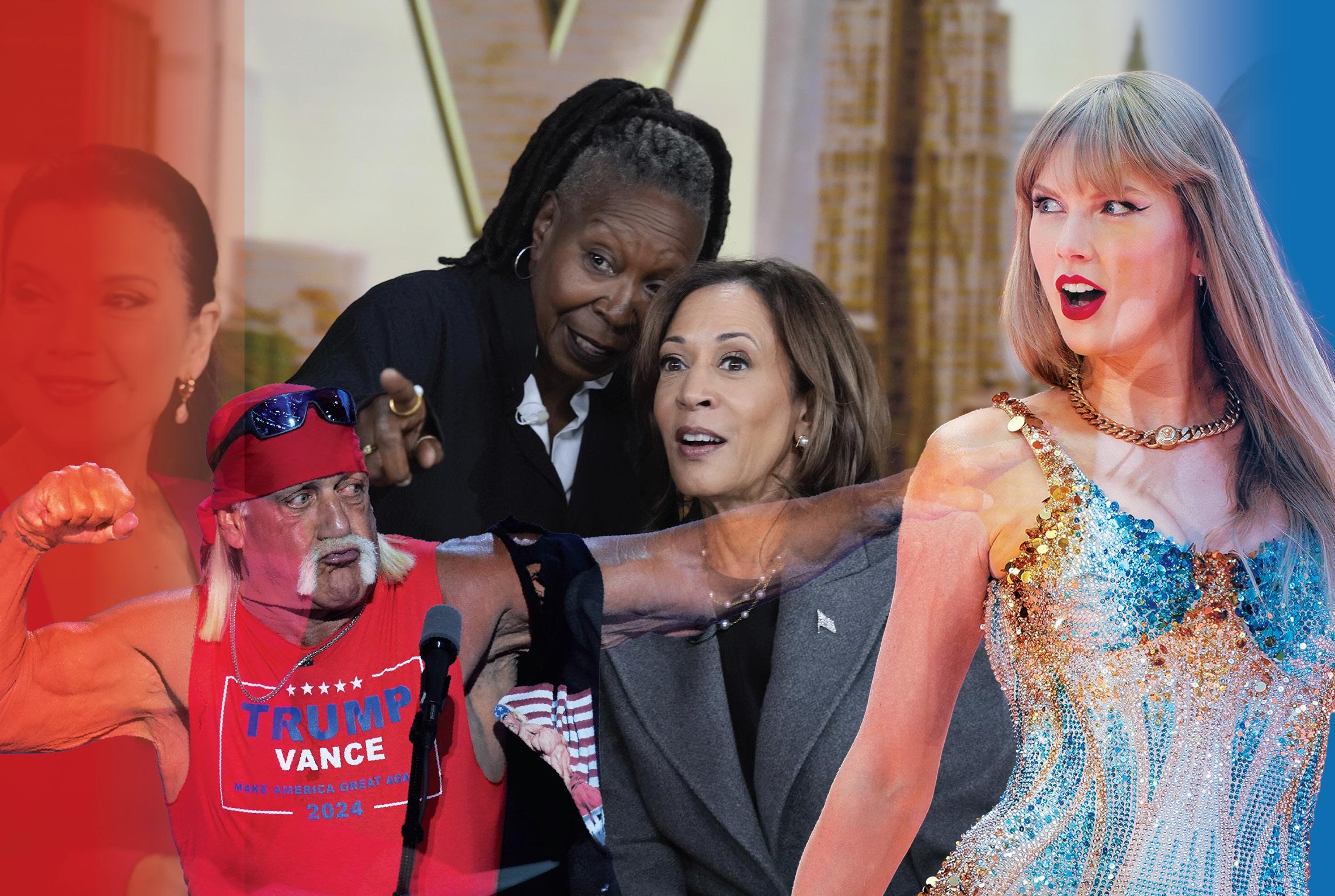
to the online rally. They raised nearly half a million dollars for Harris’ campaign.
“Kamala Harris, the world is watching, and they are talking about you,” said Goldberg, comedian and host of ‘The View’ during the online rally.
The Chicago Sun Times said, “Harris herself is a member of Alpha Kappa Alpha Sorority Inc., which along with Zeta Phi Beta, is among a group of historically Black sororities and fraternities commonly known as the “Divine Nine.”” Presidents of “D9” organizations have launched an “unprecedented” voter mobilization campaign, which boast nearly 2 million members, said Chicago Sun.
Forbes said that rapper 50 Cent’s 2023 song “Many Men (Wish Death)” started trending after former President Donald Trump’s assassination attempt. The rapers response was to put Trump’s face on the cover of “Get Rich or Die Tryin” album.
A variety of Catholic based groups have sprung into action as well in support of former President Trump, said The National Catholic Reporter.
“Catholics for Trump” said in their mission statement, “the Catholics for Trump Coalition is committed to safeguarding the vital principles of religious liberty and the sanctity of life that President Donald J. Trump has ardently championed.”
Their website said that Trump has done more for Catholics than any administration in history, providing a list of the former president’s accomplishments.
Log Cabin Republicans said that they are the nation’s largest Republican organization dedicated to representing LGBT conservatives and allies. Their website gives a list of every Republican they are endorsing for the election season. The “Q” from LGBTQ is noticeably absent on their website.
“Our chapters work at the grassroots to
tives who support them.
“A lot of time our benefits as veterans are always on the line,” Mungin said. “And honestly, it doesn’t matter who get elected.” The primary issue veterans have is access to resources. Mungin mentions how the VA is trying to stop paying out for certain disabilities. She has also struggled with appointment wait times. John Johnson, who served in the Air Force said he has little interest in politics and
build and expand a more inclusive Republican Party,” they said.
The Human Rights Campaign, which has over three million members, held a virtual event in July called “Out for Kamala Harris” that had over 25,000 LGBTQ+ in attendance. The event helped to raise over $300,000 for Harris’ campaign, with 1,500 attendees signing up to help get out the vote for Harris.
“Our strength reflects each individual’s personal commitment to helping the LGBTQ+ community in the ways they can, from marching to donating to voting,” said the HRC.
With the strength of the internet, and the power of social media, individuals have an even greater chance of finding groups that they believe in. The age of influence is undeniable this election season. Now it is up to you to choose your side, and rock the vote this 2024 election season.
views voting as a matter of “next boss.” “I never follow politics to me it all kind of seems like good ideas on both sides,” Johnson said.
Most veterans understand the power of voting and how it can help make changes. They would like to see more effort in how healthcare is being handled. Appointment wait times and issues with getting medications on time shouldn’t be an everyday concern for them.
“I’m not saying voting is the only way but it’s a big way,” Toy said. “There’s power in numbers and sincerity.”
CHEYENNE
SHAWN campus editor cheyenne shawn@my.tccd.edu
In line with the spooky season, South Campus theater students will perform as themselves but with a bit of flair during their haunting production of “Ghostlight Gallery.”
Summoned by a mysterious person, a group of friends find themselves being spooked by ghosts while in an abandoned theater for the fright of their lives.
“Ghostlight Gallery” will take place at 7:30 p.m. Oct. 24-26 at Joe B. Rushing Center for Performing Arts.
Each of the eight students performing has to play a heightened version of themselves. The audience will see some sass, humor, puns and personal quirks.
The stage set up is designed to look like an abandoned building. Instead of having assigned costumes, the students get to choose what their characters wear.
When the lights are off, the ghost comes to play.
South student Kenisha Neely known as “Lady K” tries to show her humorous side by keeping the audience laughing with certain lines her character says.
“We got ‘Beetlejuice,’” Neely says while freaking out
in one of the scenes from the play.
There’s a dash of dad humor with Terrance Wilson character. He is often heard saying “I’ve seen that.”
Theater director Lindy Benton-Muller said she’s had a great time directing this play. The groups are mostly new students doing their first show in college or first show ever.
She has worked with only one cast member before. This is the second time on stage for Esperanza Alvarez. Her character gives her friends a fake script that’s enchanting, leading them to being haunted. She can be described as sassy and egotistical.
“It’s really exciting,” Alvarez said. “I feel like I get to do a different sort of part of me.”
Karma Boase says his characters offer many punny lines. He describes his character as someone who doesn’t take a lot of this very seriously, but also has times where they can be dramatic and thoughtful.
“When the lights are on, the ghosts go away.” Boase said. “The lights are off, the ghost comes to play,” when trying to summarize the play without giving away any spoilers.
Performing on stage for the very first time, Eva Shakya talks about how she’s having a lot of fun being a part of this play.
“I’m having a lot of fun actually,” Shakya said. “The process is amazing.”
Alvarez said this is a good opportunity for students to build their strengths on stage and the audiences should find it entertaining.
“It can be really exciting watching someone grow into themselves on stage,” she said.


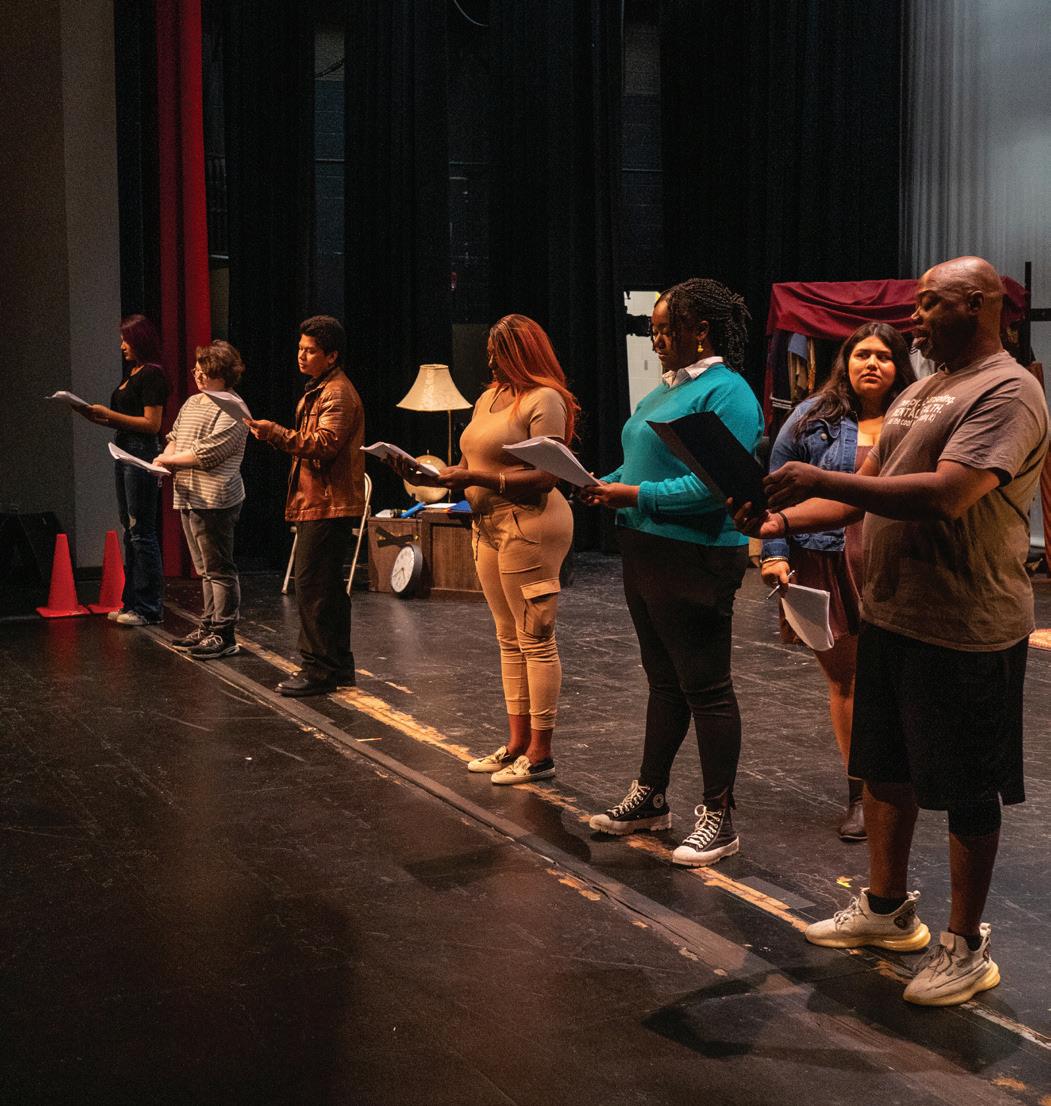
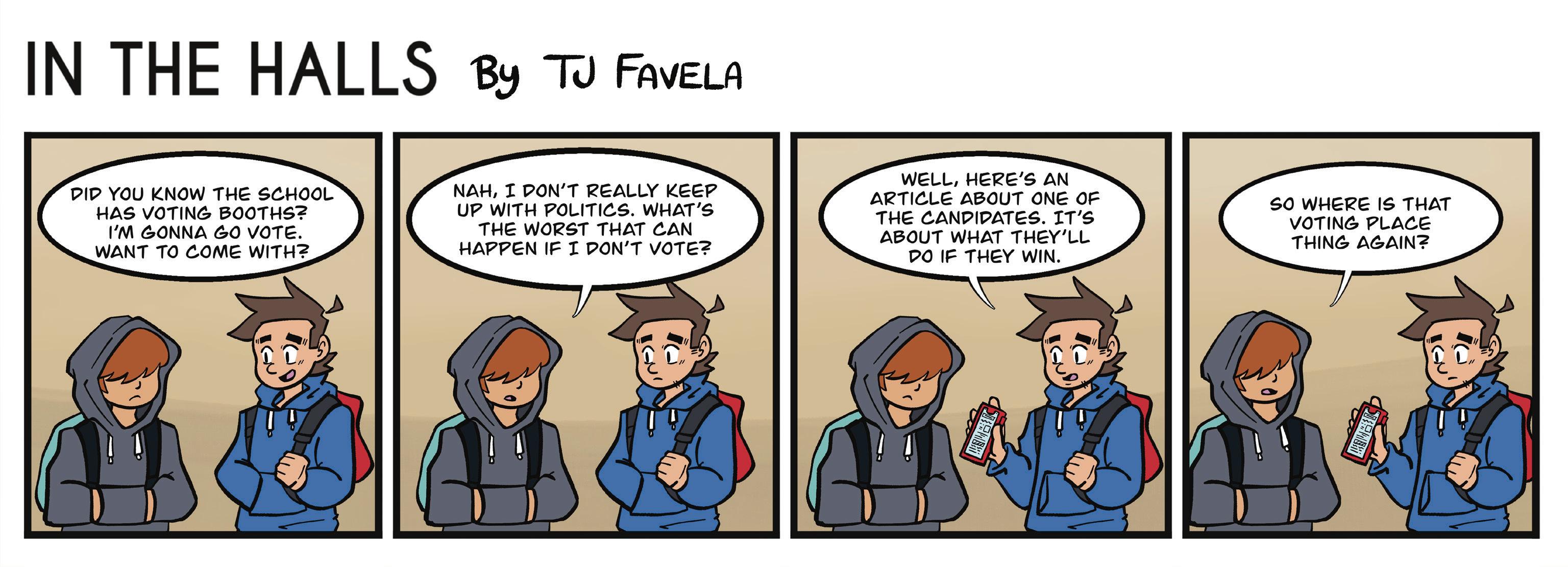


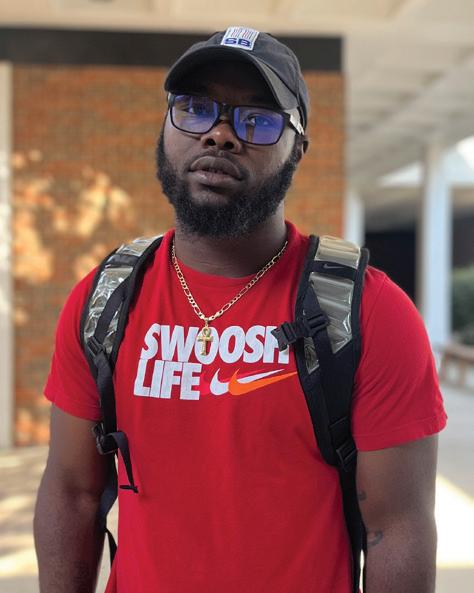
Free access to voting is the foundation of a democracy and all eligible voters should go out and vote.
College campus polling locations came under attack in September from the Tarrant County Commissioner’s office. NE, South, NW campuses, along with UTA and the Southwestern Baptist Theological Seminary were on the chopping block. Ultimately, a vote of 4-1 kept the locations open.
Texas is one of eight states that early in-person voting is available to all voters while voting by mail requires an eligible reason. (Early election begins on Oct. 21 and ends on Nov. 1. We urge the TCC community to use the on-campus sites to ensure that student voices are heard.)
All students, specifically community college students, have busy schedules. Some are in school and working multiple jobs and some have families that depend on them. Voting off campus would have been one more hurdle in the way.
It is simply more accessible for students to vote on campus and more comfortable to vote with their peers than finding and navigating another location.
Students find it frustrating that the cost of running polling sites and seniors’ accessibility issue are used as a reason to suppress student voices. Students and their families are taxpayers and members of the Tarrant County community and should be able to vote on campus.
Many young voters feel their vote doesn’t matter in the current political environment.
Our voices matter. They wouldn’t be trying to silence us if that weren’t the case.
People voting for the first time need as much information and access to polls as possible to complete their civic duty. District-wide election events have occurred for the last couple of weeks to educate students on election history and processes.
According to a Pew Research survey, the most critical issues for voters are the economy, health care, Supreme Court appointments, foreign


policy, violent crime, immigration, gun policy and abortion. All of these have an impact on college students. Based on The Collegian’s own research, the cost of living, foreign policy and partisanship are key issues that are on TCC students’ minds when
deciding to vote. Partisan groups in Texas are actively working to create barriers, such as trying to close polling sites. Having a free and fair election is a right some Americans take for granted. We should recognize that it’s a privilege
others don’t have. Voting is the most crucial action a citizen can take for themselves and others, such as those who are not eligible to vote international students, green card holders and the undocumented. Also, there are students who aren’t old enough to vote. While older voters have more time and experience voting, the issues on the ballot will have more of an impact on this generation and their children than it does on the older generation.
After speed-running her way to stardom, Chappell Roan found the experience difficult.
From obsessive fans, to vicious hate trains, she’s fallen victim to the same fame-trap many celebrities know well: Have a backbone or become sterile and digestible.
Her most recent run-in with the toxicity of the parasocial relationship between herself and her fans involves the upcoming presidential election.
In an interview with The Guardian, she said she didn’t plan on endorsing a presidential candidate as there are problems on both sides.
The swift backlash in response to her statement was disappointing. The amount of blind allegiance people have to candidates who are actively funding a genocide is troubling.
With the lighthearted memes and active rallying on both sides despite deadly policies, it’s morally

sound for a celebrity to refuse to play into the desensitized spectacle.
After the fallout, Roan released a statement saying, “So yeah, I’m voting for f---ing Kamala.”
However, she stood by her original stance. We need to be critical of politicians.
I’m losing faith in the public’s ability to evaluate political information after seeing some of the replies to her statements.
The hero worship seen with politicians in the U.S. is reflected in celebrity culture.
The U.S. is unique in the way its political parties bank on celebrity endorsements. It’s a tangled mess of status, influence and power with no transparency.
Roan’s rejection of becoming a polished figure for the public comes with consequences.
Celebrity culture in the U.S. is predatory. Fans project what they want their favorite celebrity to be without regard to who they are.
When Roan strayed from the image her fans had of her, they attacked her as if they knew her personally.
Due to this culture, Roan needs to take steps to protect herself, such as limiting her public appearances and commentary on issues she feels passionate about.
It isn’t fair, but the predatory culture will not change anytime soon. It will probably get worse.
Roan actively tries to put forth boundaries between her and her fans. From declining photographs to cancelling concerts, to prioratiz-
ing her mental well-being, she is committed to putting herself first.
This kind of pushback from a celebrity can polarize fans but it is within her right.
Ideally, the reliance on presidential candidates for social change would be replaced with local efforts to build community and support systems devoid of discrimination. These efforts are happening in every pocket of the U.S. and would benefit from as many supporters as they can get.
To combat the despair permeating our society, students should prioritize getting to know their community on a low-stakes scale. There are local book clubs, library programs, fundraisers, artbased meetups, volunteer drives and even just taking the initiative to invite your friend out for lunch.
The more we rely on our immediate community, the less we feel the need to get caught up in parasocial relationships with celebrities and politicians.
Immigrant tropes are once again being used as a tool to drive a wedge between Americans.
Former President Donald Trump’s comments about the Haitian immigrants of Springfield, Ohio, during the presidential debates is the latest example of immigrant communities being demonized for political gain.
He falsely accused them of abducting and eating pets to play into the common trope mostly associated with Asian immigrants. Trump wants to stir outrage within his party and create hostility against immigrants, especially in this crucial election year.
Immigration is a key issue in the political platforms of Democrats and Republicans. Recent discussions, however, seem more like acidic attacks than an attempt to negotiate a compromise.
Caught in the middle of this whirlwind are the millions of immigrants who live in the U.S.
They are not allowed to live as they are. Their very existence has been condensed into a few false claims about how they affect Ameri-

cans.
Immigrants coming to America are stealing our jobs and lazily living off government benefits. Immigrants are criminals, drug lords and terrorists. Immigrants will eat your pets.
These tropes and discussions of immigration policies can be traced back to the 19th century. The purpose is to make immigrants into the big, bad wolf that the American people must unite against.
The Chinese Exclusion Act of 1882 is an example of how a perceived threat to Americans can result in the further marginalization of the immigrants.
Chinese immigrants were restricted from immigrating to the U.S. under penalty of imprisonment and deportation because they were seen as taking work away from Americans. In propaganda material, these Chinese immigrants were depicted as ugly and scheming, which only bolstered the pre-existing negative stereotypes.
Trump is an example of how far this fear-mongering can go.
For years he has hurled derogatory statements about the immigrants coming into America. Both of his campaigns for president were heavily reliant on anti-immigration platforms.
Since the beginning of his political career, Trump has called immigrants everything from murderers to rapists. He lumps the diverse immigrant communities together into a group of lazy, job-stealing “animals.”
He has persisted in spreading panic and fear among the American people against a minority population.
Trump claimed the Haitians in Springfield, who legally have been given temporary protected status, were in
the country illegally and that they will destroy the city. Following the debate, the city received bomb threats, and the Haitian community has spoken out about feeling unsafe. Most concerningly is how Trump and his running mate don’t seem to care about the consequences of the false rumors they spread.
JD Vance said on CNN that he thought the media ignored what was happening in Springfield before Trump’s comments.
In a damning quote, the Ohio senator said if he had to “create stories so that the American media actually pays attention to the suffering of the American people,” then he will do it. It’s clear that Trump and Vance will continue to spread lies about immigrants if it benefits their political agenda. In the process, they will pit Americans against each other. And when the nation is split in half, we move farther away from the “more perfect Union” our founding fathers described.
say that we’re not eating dogs.”
NE student Chriss Aguirre, though, said Harris’ campaign strategy to appeal to the younger generation through pop culture isn’t effective. Aguirre said Harris seems more concerned with the celebrity vote.
“It’s important for people to know more about the policies of each candidate, rather than the parties themselves,” Aguirre said.
Aguirre is still unsure of who to vote for. Project 2025, a blueprint for a conservative administration that has been under fire from Democrats, at first led Aguirre to decide to vote Democratic, but now a distrust in Harris is causing Aguirre to reevaluate.
“[This election] impacts me and my partner’s ability to be happy in the future,” Aguirre said.
Aguirre’s main concern is accessible and affordable health care for everyone, but the student said this can’t be obtainable without a decrease in the cost of living.
Inflation is a crucial factor for students, but there is a divide between which candidate they feel has a better solution for the issue.
South student Emma Moore voted for Trump in the 2020 election and will again this year.
“Harris says she wants to fix the economy, as if she hasn’t been in office the past four years,” Moore said.
Moore does not support Trump’s beliefs, but she thinks he is the better option. Similar to Aguirre, Moore said she does not trust Harris.
“When Harris is asked about her plan, she has to mention she grew up middle class,” Moore said. “She doesn’t know how to answer questions. It’s concerning to be honest.”
Students voting for Harris argued she values the growth of middle-class families due to her experience growing up in one.
“I like her policies on tax

breaks for the middle class,” said Layla Garcia, a NE student.
Garcia, a young Hispanic woman, said Harris could change a lot of lives among minority groups for the better, but she critiqued the Biden-Harris administration’s involvement in Israel’s attacks on Gaza.
“I’m opposed to genocide,” Garcia said.
Students unanimously agreed that aid spent on other countries should be used for the American people.
Riley Osborn is a South student who will vote for Trump because she believes “he cares a lot for America.”
“There’s so many people recovering from [hurricane Helene], and Harris hasn’t done a thing about it,” Osborn said.
Osborn is a Christian, and she said Harris’ stance on abortion is
another reason she will vote for Trump.
However, many students’ stance on abortion and LGBTQIA+ rights were the determining factor of their decision.
“I instantly think that if the other candidate won, that it would be a life-or-death situation for many people who are in my life,” said NE student Madison Mayberry.
Mayberry said she is focused on the impact Trump’s presidency could have on minority communities such as people of color, disabled individuals and young women. Harris is the only candidate Mayberry said will protect these groups.
And most students agreed that Harris’ campaign does make them believe she will fight for their rights, but they are proceeding with
caution and plan to research more before voting.
Although, some people like SE student Jonathon Mendoza have no confidence in either candidate or the two-party system.
“I feel like each candidate picks a type of person and they stand up for those people, but not all people,” Mendoza said. “And that’s been a thing forever.”
Similarly, NE student Bryan Popp said he is choosing not to vote due to the nature of politics.
“I’m done relying on political figures to take control,” Popp said. “There’s a lot of division that’s currently in this country right now and, for me, I’m not buying into it anymore.”
At a mock voting event Oct. 9 on South Campus, Joshua Torres cast his ballot in the student hub. When asked who he voted for, Torres laughed.
“I just voted for my favorite superhero,” he said.
Everyone did. To get firsttime voters comfortable with real voting machines, workers from the Tarrant County Elections office held a mock election asking everyone to vote for a superhero.
Torres said he appreciated the practice, but as a 17-year-old, he can’t vote yet. It is a strange feeling for the students who can’t vote, according to Torres. He said their lives are going to be impacted by the votes of other students they are in classes with daily.
“I wish I was able to vote right now,” Torres said.
Vanessa Cruz, a thirdtime voter at the event, said she participated for the rubber duckies handed out afterward.
She will vote in this election and said she feels it’s important for her to exercise her right for herself and her community.
“Even though I’m one singular person, I feel like my vote still counts. I can still make a change with other voters out there,” Cruz said. “[And] if someone can’t vote, then I’m there for them.”



REBECCA CHAMPLIN campus editor rebecca.champlin@my.tccd.edu
Connect Campus President Carlos Morales, has a doctorate in instructional design for online learning and a lot of advice for his students.
Morales came to TCC in 2013 and has been a leader at the regional and national level for online learning.
“Online education is a learning preference,” Morales said, “similar to how some people can listen to music while learning where some need silence.”
Connect offers everything that inperson classes offer. The difference is that tutoring, supplemental instruction and connecting with faculty are all available online. They also have transfer fairs, online speakers and even a chapter of Phi Theta Kappa.
“I want to remove the barriers, shorten the distance and create the best environment for the students to fulfill their desire of obtaining a higher education,” Morales said. Morales advised students to find what interests and motivates them in life. He said individuals can make up to a million dollars more in a lifetime
with a college degree.
“Education is the only thing that no one can take away from you,” he said.
Morales grew up in Puerto Rico where he was surrounded by librarians, engineers, nurses and teachers. He attended the Inter-American University of Puerto Rico for his bachelor’s and master’s degrees. He then pursued his doctoral degree in the United States.
“The only inheritance my parents gave me was my education,” Morales said.
Nearly two of every five TCC students take classes through Connect.
Many Connect students are an older demographic that go straight to work and then attend classes online. Morales said he commends students for returning to school.
“The online community has many different needs,” he said.
Life, commitments, financial aid and food insecurity are some challenges that online students face, Morales said. If a student is struggling in a class, he encourages them to take advantage of all the resources made available to students.
“Reach out,” Morales said, “those professionals are here and waiting to connect with you.”
There is never a perfect time to go
back to school, he said.
“If you wait until everything is perfect, time flies and you lose the opportunity to go to school early,” he said.
Morales has worked hard to develop the online curriculum that Connect students work with now. They have an instructional design group that helps the faculty to build their online classes.
“We must find and design the best strategies for those activities that are taught from a distance,” he said.
His faculty are all certified to teach online. They must renew their certification regularly.
“If it was not as structured online as we have built it, a number of students would not be able to come to college,” Morales said.
Regarding artificial intelligence, Morales wants to equip the students with the best way to use the tool. He said he wants AI to be seen as a tool versus something that hinders, with many employers asking about a person’s skills with AI.
Morales continues to pave the way of online learning for students and his faculty.
“My desire is to facilitate the dreams of the students,” he said.